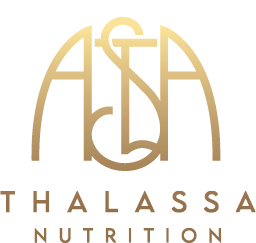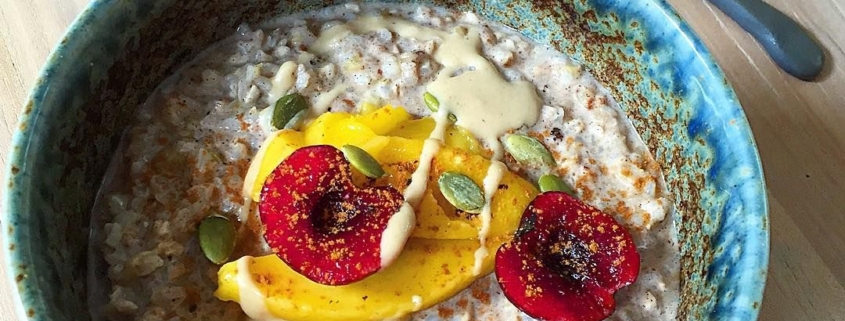Plant-based and Cholesterol
Cholesterol is an important part of heart health to be aware of with each meal and snack you choose. Though it sounds like a complicated part of our health, it’s actually a pretty simple one. Cholesterol is produced in the liver, primarily by saturated fats, which is one reason a diet high in saturated fats (from animal-based foods and refined veggie oils) is said to be harmful for your heart health. Cholesterol travels through the blood via the arteries, which is why a high cholesterol diet can lead to clogged arteries that prevent proper blood flow to your heart, leading to heart disease and even diabetes. Your body can use fats from your diet to produce cholesterol on its own, which makes added (dietary) sources of cholesterol something you’ll want to avoid in order to lower bad cholesterol (LDL) and raise good cholesterol (HDL). This is one reason why a plant-based diet is now being advised as the best diet to eat for overall heart health and longevity. Plant-based foods also improve liver function, and also provide antioxidants to support the immune system. Most all plant-based foods provide a major boost for your cholesterol, but some have specific benefits not to miss out on.
1. Lutein-Rich Spinach
Lutein is a yellow pigmented antioxidant that is found abundantly in spinach, even more than other greens. It’s known to provide protection against macular degeneration for healthy eyes, but research also shows that it helps lower the bad cholesterol by preventing clogged arteries. Though egg yolks are known as the best source of dietary lutein, they’re also high in cholesterol and inflammatory animal-based saturated fats. Instead, use 2 cups of spinach in a smoothie or salad for lutein, 10 grams of protein, and a heart-healthy dose of vitamin E, stress reducing magnesium, and an abundance of B vitamins also needed for a healthy liver and metabolism.
2. Oats
Source: Matcha Porridge With Pomegranate Seeds
Oats and oat bran (the most fiber-rich part of the grain) are two of the best foods you can include each day to fight high cholesterol and reduce your risk of heart disease on an ongoing basis. Oats are full of beta-glucan fibers, an important type of soluble fiber that acts like a broom in the arteries (and digestive tract) to sweep out cholesterol and daily toxins. Enjoy 1/3 cup day to get the delicious benefits. If you like and eat barley, it also offers the same benefits as oats.
3. Walnuts
Source: Healthy Fats Advertisement
Walnuts are a fantastic source of omega 3 fats. These fats lower cholesterol directly by reducing inflammation and raising good cholesterol (HDL). Though seafood is a natural source of omega 3 fats, it’s also very high in cholesterol to most people’s surprise. Walnuts, on the other hand, are not only free of cholesterol, but they also don’t come with the same health risks like mercury and toxin exposure that fish do. Enjoy 4-6 walnuts a day to reap the benefits. They go great on top of oatmeal, on a smoothie, or can be enjoyed as a snack or in an entrée.
4. Beans
Source: Tamale Inspired Bowls With Beans Advertisement
If you love beans, then good news – they love you too! Beans are the highest fiber food aside from chia, coconut flour, and bran per serving. They help keep our bones strong, and are incredible sources of antioxidants, folate (a B vitamin), potassium, magnesium, protein, and iron. Beans’ fiber has been shown to improve heart health and directly lower high cholesterol in a short amount of time. Legumes (such as lentils and green peas) also come with the same benefits. Try some of our favorite bean recipes from burgers to chili, and everything in between!
5. Avocado
Source: Mexican Black Bean Soup Advertisement
Okay avocado lovers, rejoice once more – these little babies are awesome for your heart health! They directly lower cholesterol due to a type of fat they have known as beta-sitosterols. These fats reduce bad cholesterol (LDL) and raise good cholesterol (HDL), helping to improve your heart health with every bite. They are high in fats, so no need to go overboard; just 1/4 a fruit each day or one or two a week is enough to get the benefits. Out of avocados? Go get yourself one at the store and use the pit to grow your own avocados in just weeks with this product!
6. Most All Nuts and Seeds
Source: Jules/Flickr
Aside from walnuts, most all nuts and seeds are also high in certain fats known as mono-unsaturated fats that lower bad cholesterol. They also provide anti-inflammatory support and contain antioxidants that support overall heart health. As a bonus, these foods are also good sources of plant-based protein and they support collagen production in the body to fight the effects of aging. A little goes a long way, so enjoy 1/4 cup a day to gain the benefits. Try them in some raw energy bars or toss a few into your next smoothie or breakfast bowl.
7. Natural Soy Foods
Source: Super Protein Kale Caesar Salad
Don’t go running if you hate soy – listen up! We’re not talking about highly processed forms of soy like chalky soy protein powders, we’re talking about cleaner, more whole food forms of soy. Think tempeh, tofu, and whole soy beans (edamame). Non-GMO soy milk and soy yogurt also make good choices if bought from a high-quality organic brand (choose unsweetened if possible). Soy contains higher amounts of isoflavones than most foods, which directly reduce high cholesterol in the body and improve overall heart health. Concerned about soy and cancer? Isoflavones from soy have actually shown to reduce cancer risks, despite the myth that soy causes breast cancer. Enjoy it a couple times a week and see how it works for you.
8. Berries
Source: Strawberry Mousse
Berries are packed with soluble fibers that reduce high cholesterol and assist with good digestion. They’re also a top source of antioxidants that fight immune system invaders to improve your overall health. No berry shows more benefits over another for cholesterol, so include blueberries, strawberries, goji berries, cranberries, blackberries, raspberries and others such as acai, golden berries and mulberries for even more benefits.
9. Cacao
Source: Raw Chocolate Energy Bites
What can’t this everyday superfood do? Cocoa and cacao boost arterial health by improving blood flow, reducing blood pressure, and they contain soluble and insoluble fibers that lower cholesterol and improve heart health. Cacao is also a good source of sulfur, a mineral that supports healthy liver function for daily detoxification. Try to enjoy it raw, though regular plain cocoa is also helpful if you don’t have access to raw cacao powder or nibs. Avoid highly sweetened and refined cocoa powders and bars however possible. Try cacao in some of our favorite healthy chocolate recipes!
10. Garlic
Source: Roasted Veggies With Buttery Garlic and Spinach Salad
A food you might think of as more of a flavoring option, is actually one of the best for lowering cholesterol and preventing blood clots. Now, keep in mind, this doesn’t count for garlic powder and garlic flavored foods, but the actual garlic cloves. Use one or two cloves a day in a savory entrée of your choice; just be sure to chop it finely, since the process releases the beneficial compounds found in garlic and makes them more readily available for absorption. You can also grow your own garlic at home so you always have some on hand! Other cholesterol supportive foods include all fruits and vegetables, whole grains of any kind, herbs, spices, and herbal and regular tea. Consume these foods liberally everyday, rotating which ones you buy and use, and you can be sure your heart health will improve as a result!



 no
no